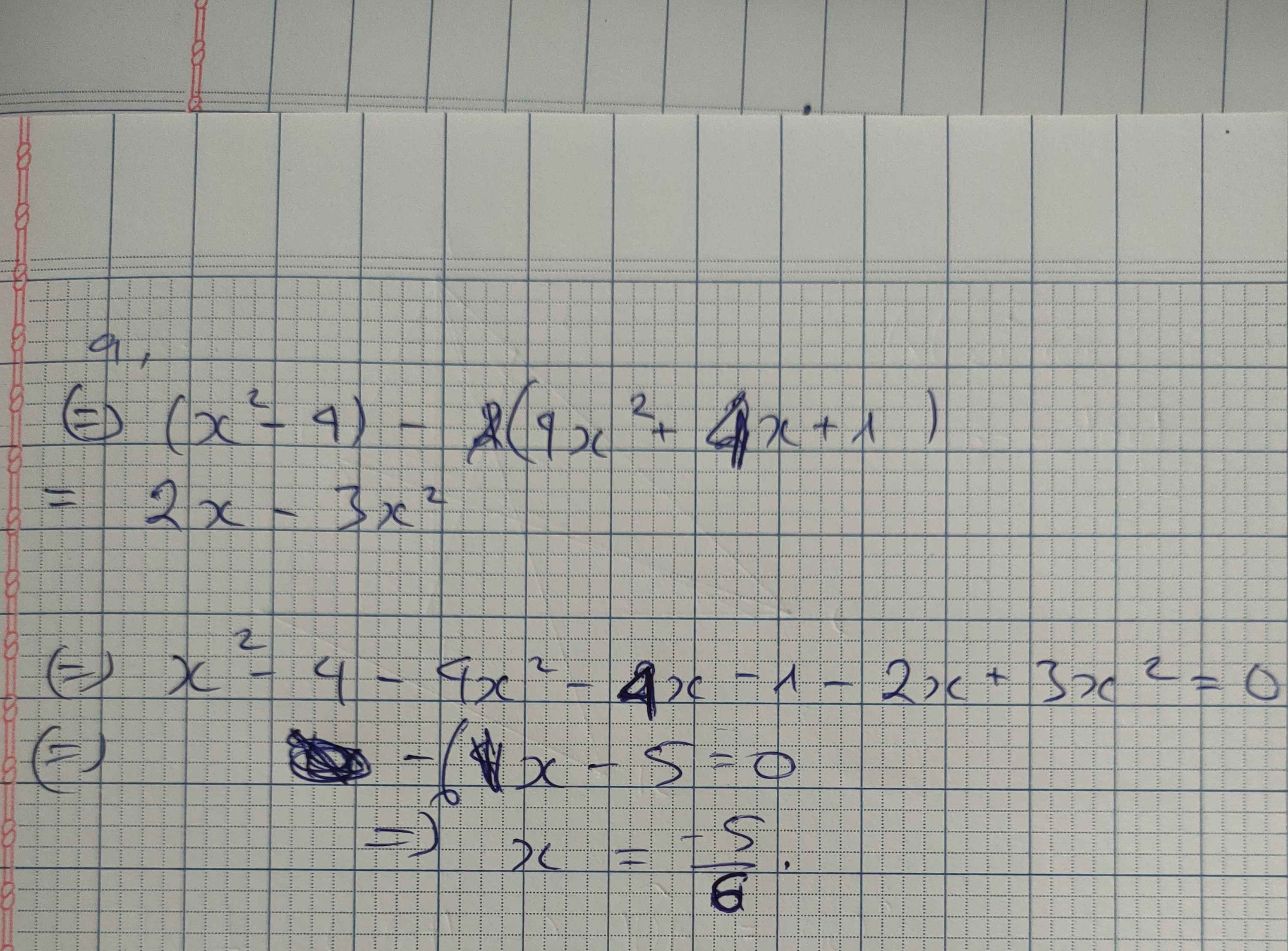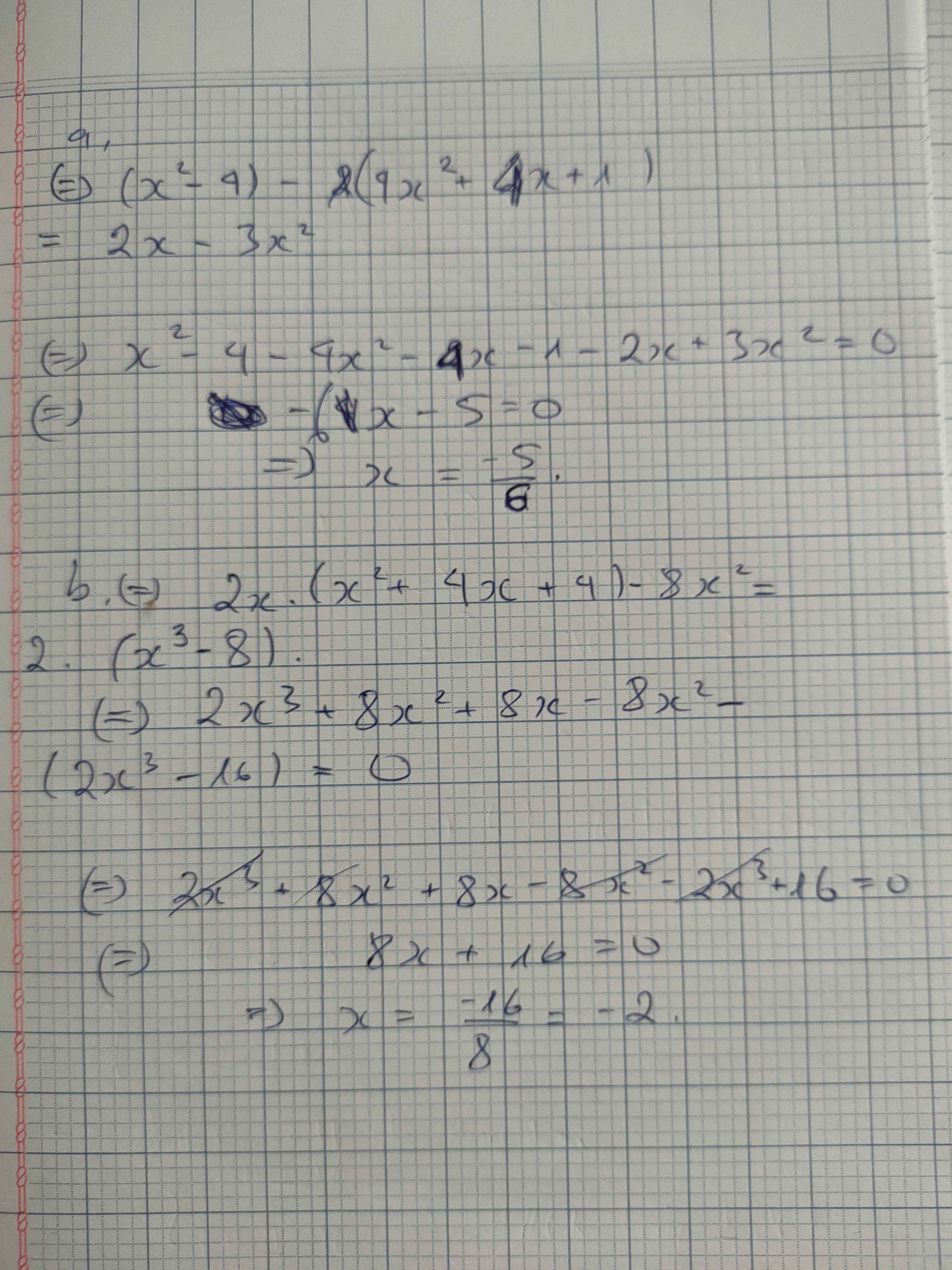
Những câu hỏi liên quan
câu1: giải phương trình
a) 2x-3=3(x+1)
3x-3=2(x+1)
b)(3x+2)(4x-5)=0
(3x+5)(4x-2)=0
c) |x-7|=2x+3
|x-4|=5-3x
a) \(2\chi-3=3\left(\chi+1\right)\)
\(\Leftrightarrow2\chi-3=3\chi+3\)
\(\Leftrightarrow2\chi-3\chi=3+3\)
\(\Leftrightarrow\chi=-6\)
Vậy phương trình có tập nghiệm S= \(\left\{-6\right\}\)
\(3\chi-3=2\left(\chi+1\right)\)
\(\Leftrightarrow3\chi-3=2\chi+2\)
\(\Leftrightarrow3\chi-2\chi=2+3\)
\(\Leftrightarrow\chi=5\)
Vậy phương trình có tập nghiệm S= \(\left\{5\right\}\)
b) \(\left(3\chi+2\right)\left(4\chi-5\right)=0\)
\(\Leftrightarrow\left[{}\begin{matrix}3\chi+2=0\\4\chi-5=0\end{matrix}\right.\)
\(\Leftrightarrow\left[{}\begin{matrix}3\chi=-2\\4\chi=5\end{matrix}\right.\)
\(\Leftrightarrow\left[{}\begin{matrix}\chi=\dfrac{-2}{3}\\\chi=\dfrac{5}{4}\end{matrix}\right.\)
Vậy phương trình có tập nghiệm S= \(\left\{\dfrac{-2}{3};\dfrac{5}{4}\right\}\)
\(\left(3\chi+5\right)\left(4\chi-2\right)=0\)
\(\Leftrightarrow\left[{}\begin{matrix}3\chi+5=0\\4\chi-2=0\end{matrix}\right.\)
\(\Leftrightarrow\left[{}\begin{matrix}3\chi=-5\\4\chi=2\end{matrix}\right.\)
\(\Leftrightarrow\left[{}\begin{matrix}\chi=\dfrac{-5}{3}\\\chi=\dfrac{1}{2}\end{matrix}\right.\)
Vậy phương trình có tập nghiệm S= \(\left\{\dfrac{-5}{3};\dfrac{1}{2}\right\}\)
c) \(\left|\chi-7\right|=2\chi+3\)
Trường hợp 1:
Nếu \(\chi-7\ge0\Leftrightarrow\chi\ge7\)
Khi đó:\(\left|\chi-7\right|=2\chi+3\)
\(\Leftrightarrow\chi-7=2\chi+3\)
\(\Leftrightarrow\chi-2\chi=3+7\)
\(\Leftrightarrow\chi=-10\) (KTMĐK)
Trường hợp 2:
Nếu \(\chi-7\le0\Leftrightarrow\chi\le7\)
Khi đó: \(\left|\chi-7\right|=2\chi+3\)
\(\Leftrightarrow-\chi+7=2\chi+3\)
\(\Leftrightarrow-\chi-2\chi=3-7\)
\(\Leftrightarrow-3\chi=-4\)
\(\Leftrightarrow\chi=\dfrac{4}{3}\)(TMĐK)
Vậy phương trình có tập nghiệm S=\(\left\{\dfrac{4}{3}\right\}\)
\(\left|\chi-4\right|=5-3\chi\)
Trường hợp 1:
Nếu \(\chi-4\ge0\Leftrightarrow\chi\ge4\)
Khi đó: \(\left|\chi-4\right|=5-3\chi\)
\(\Leftrightarrow\chi-4=5-3\chi\)
\(\Leftrightarrow\chi+3\chi=5+4\)
\(\Leftrightarrow4\chi=9\)
\(\Leftrightarrow\chi=\dfrac{9}{4}\)(KTMĐK)
Trường hợp 2: Nếu \(\chi-4\le0\Leftrightarrow\chi\le4\)
Khi đó: \(\left|\chi-4\right|=5-3\chi\)
\(\Leftrightarrow-\chi+4=5-3\chi\)
\(\Leftrightarrow-\chi+3\chi=5-4\)
\(\Leftrightarrow2\chi=1\)
\(\Leftrightarrow\chi=\dfrac{1}{2}\)(TMĐK)
Vậy phương trình có tập nghiệm S=\(\left\{\dfrac{1}{2}\right\}\)
Đúng 1
Bình luận (0)
Bài 1 : giải phương trình
a) (x-2)(x+2)-(2x+1)2=x(2-3x)
b) 2x(x+2)2-8x2=2(x-2)(x2+2x+4)
c) (x-2)3+(3x-1)(3x+1)=(x+1)3
d) 5(2x-3)-4(5x-7)=19-2(x+1)2
a: \(\Leftrightarrow x^2-4-4x^2-4x-1-2x+3x^2=0\)
=>-6x-5=0
=>-6x=5
hay x=-5/6
b: \(\Leftrightarrow2x^3+8x^2+8x-8x^2-2x^3+16=0\)
=>8x+16=0
hay x=-2
c: \(\Leftrightarrow x^3-6x^2+12x-8+9x^2-1-x^3-3x^2-3x-1=0\)
=>9x-10=0
hay x=10/9
d: \(\Leftrightarrow10x-15-20x+28=19-2x^2-4x-2\)
\(\Leftrightarrow-10x+13+2x^2+4x-17=0\)
\(\Leftrightarrow2x^2-6x-4=0\)
\(\Leftrightarrow x^2-3x-2=0\)
\(\text{Δ}=\left(-3\right)^2-4\cdot1\cdot\left(-2\right)=9+8=17>0\)
Do đó: Phương trình có hai nghiệm phân biệt là:
\(\left\{{}\begin{matrix}x_1=\dfrac{3-\sqrt{17}}{2}\\x_2=\dfrac{3+\sqrt{17}}{2}\end{matrix}\right.\)
Đúng 1
Bình luận (0)
Xem thêm câu trả lời
Bài 3 Giải Phương Trình
a) 4x-2 = 1/x-1 - 5/x^2- x
b) -x^2+12x+4/x^2+3x-4 = 12/x+4 + 12/3x-3
c) 1/x-1 + 2/x^2-5 = 4/x^2+x+1
d) 1/2x^2+5-7 - 2/x-1 = 3/2x^2-5x-7
b: \(\Leftrightarrow\dfrac{-3x^2+36x+12}{3\left(x+4\right)\left(x-1\right)}=\dfrac{36\left(x-1\right)}{3\left(x+4\right)\left(x-1\right)}+\dfrac{12\left(x+4\right)}{3\left(x-1\right)\left(x+4\right)}\)
\(\Leftrightarrow-3x^2+36x+12=36x-36+12x+48\)
\(\Leftrightarrow-3x^2+36x+12-48x-12=0\)
\(\Leftrightarrow3x\left(x+4\right)=0\)
=>x=0(nhận) hoặc x=-4(loại)
Đúng 0
Bình luận (0)
giải phương trình
a.(2x- 1)x x^2+ 9x (1 - 2x) = 0
b. \(\dfrac{x+4}{5}\)-x -5= \(\dfrac{x+3}{3}\)- \(\dfrac{x-2}{2}\)
c.(x- 5)x (6x+ 3)= (2x-7)x (3x + 5)
d. \(\dfrac{x+4}{5}\)-2x+ 1= \(\dfrac{x}{3}\)- \(\dfrac{2-x}{6}\)
b: =>1/4x+4/5-x-5=1/3x+1-1/2x+1
=>-3/4x+1/6x=2+5-4/5=24/5
=>x=-288/35
c: =>6x^2+3x-30x-15=6x^2+10x-21x-35
=>-27x-15=-11x-35
=>-16x=-20
=>x=5/4
Đúng 0
Bình luận (0)
Giải phương trình
a, (x^2-2)(x^2+x+1)=0
b, 16x^2 - 8x + 5=0
c, 2x^3 - x^2 - 8x + 4=0
d, 3x^3+6x^2 - 75x -150 = 0
e, 2x^5-3x^4+6x^3-8x^2+3=0
*vn:vô nghiệm.
a. \(\left(x^2-2\right)\left(x^2+x+1\right)=0\)
\(\Leftrightarrow\left[{}\begin{matrix}x^2-2=0\\x^2+x+1=0\end{matrix}\right.\)
\(\Leftrightarrow\left[{}\begin{matrix}\left(x-\sqrt{2}\right)\left(x+\sqrt{2}\right)=0\\\left(x+\dfrac{1}{2}\right)^2+\dfrac{3}{4}=0\left(vn\right)\end{matrix}\right.\)
\(\Leftrightarrow x=\pm\sqrt{2}\)
-Vậy \(S=\left\{\pm\sqrt{2}\right\}\).
b. \(16x^2-8x+5=0\)
\(\Leftrightarrow16x^2-8x+1+4=0\)
\(\Leftrightarrow\left(4x-1\right)^2+4=0\) (vô lí)
-Vậy S=∅.
c. \(2x^3-x^2-8x+4=0\)
\(\Leftrightarrow x^2\left(2x-1\right)-4\left(2x-1\right)=0\)
\(\Leftrightarrow\left(2x-1\right)\left(x^2-4\right)=0\)
\(\Leftrightarrow\left(2x-1\right)\left(x-2\right)\left(x+2\right)=0\)
\(\Leftrightarrow\left[{}\begin{matrix}x=\dfrac{1}{2}\\x=\pm2\end{matrix}\right.\)
-Vậy \(S=\left\{\dfrac{1}{2};\pm2\right\}\).
d. \(3x^3+6x^2-75x-150=0\)
\(\Leftrightarrow3x^2\left(x+2\right)-75\left(x+2\right)=0\)
\(\Leftrightarrow3\left(x+2\right)\left(x^2-25\right)=0\)
\(\Leftrightarrow3\left(x+2\right)\left(x+5\right)\left(x-5\right)=0\)
\(\Leftrightarrow\left[{}\begin{matrix}x=-2\\x=\pm5\end{matrix}\right.\)
-Vậy \(S=\left\{-2;\pm5\right\}\)
Đúng 1
Bình luận (0)
Giải phương trình
a) \(\sqrt{2x-5}=\sqrt{x+3}\)
b) \(\sqrt{2x^2-x+4}-2=x\)
c) \(\sqrt{1-x}=\sqrt{3x+2}\)
d) \(\sqrt{2x-3}=\sqrt{x-2}\)
e) \(\sqrt{x-2}-\sqrt{3+2x}=0\)
giải phương trình
a.\(\left(2x-3\right)^2=\left(2x-3\right)\left(x+1\right)\)
b.\(x\left(2x-9\right)=3x\left(x-5\right)\)
c.\(3x-15=2x\left(x-5\right)\)
d.\(\dfrac{5-x}{2}=\dfrac{3x-4}{6}\)
e.\(\dfrac{3x+2}{2}-\dfrac{3x+1}{6}=2x+\dfrac{5}{3}\)
a) Ta có: \(\left(2x-3\right)^2=\left(2x-3\right)\left(x+1\right)\)
\(\Leftrightarrow\left(2x-3\right)^2-\left(2x-3\right)\left(x+1\right)=0\)
\(\Leftrightarrow\left(2x-3\right)\left(2x-3-x-1\right)=0\)
\(\Leftrightarrow\left(2x-3\right)\left(x-4\right)=0\)
\(\Leftrightarrow\left[{}\begin{matrix}2x-3=0\\x-4=0\end{matrix}\right.\Leftrightarrow\left[{}\begin{matrix}2x=3\\x=4\end{matrix}\right.\Leftrightarrow\left[{}\begin{matrix}x=\dfrac{3}{2}\\x=4\end{matrix}\right.\)
Vậy: \(S=\left\{\dfrac{3}{2};4\right\}\)
b) Ta có: \(x\left(2x-9\right)=3x\left(x-5\right)\)
\(\Leftrightarrow x\left(2x-9\right)-3x\left(x-5\right)=0\)
\(\Leftrightarrow x\left(2x-9\right)-x\left(3x-15\right)=0\)
\(\Leftrightarrow x\left(2x-9-3x+15\right)=0\)
\(\Leftrightarrow x\left(6-x\right)=0\)
\(\Leftrightarrow\left[{}\begin{matrix}x=0\\6-x=0\end{matrix}\right.\Leftrightarrow\left[{}\begin{matrix}x=0\\x=6\end{matrix}\right.\)
Vậy: S={0;6}
c) Ta có: \(3x-15=2x\left(x-5\right)\)
\(\Leftrightarrow3\left(x-5\right)-2x\left(x-5\right)=0\)
\(\Leftrightarrow\left(x-5\right)\left(3-2x\right)=0\)
\(\Leftrightarrow\left[{}\begin{matrix}x-5=0\\3-2x=0\end{matrix}\right.\Leftrightarrow\left[{}\begin{matrix}x=5\\2x=3\end{matrix}\right.\Leftrightarrow\left[{}\begin{matrix}x=5\\x=\dfrac{3}{2}\end{matrix}\right.\)
Vậy: \(S=\left\{5;\dfrac{3}{2}\right\}\)
d) Ta có: \(\dfrac{5-x}{2}=\dfrac{3x-4}{6}\)
\(\Leftrightarrow6\left(5-x\right)=2\left(3x-4\right)\)
\(\Leftrightarrow30-6x=6x-8\)
\(\Leftrightarrow30-6x-6x+8=0\)
\(\Leftrightarrow-12x+38=0\)
\(\Leftrightarrow-12x=-38\)
\(\Leftrightarrow x=\dfrac{19}{6}\)
Vậy: \(S=\left\{\dfrac{19}{6}\right\}\)
e) Ta có: \(\dfrac{3x+2}{2}-\dfrac{3x+1}{6}=2x+\dfrac{5}{3}\)
\(\Leftrightarrow\dfrac{3\left(3x+2\right)}{6}-\dfrac{3x+1}{6}=\dfrac{12x}{6}+\dfrac{10}{6}\)
\(\Leftrightarrow6x+4-3x-1=12x+10\)
\(\Leftrightarrow3x+3-12x-10=0\)
\(\Leftrightarrow-9x-7=0\)
\(\Leftrightarrow-9x=7\)
\(\Leftrightarrow x=-\dfrac{7}{9}\)
Vậy: \(S=\left\{-\dfrac{7}{9}\right\}\)
Đúng 2
Bình luận (0)
giải phương trình
a,2x/x-3=x^2+11x-6/x^2-9
b,3x^2+(1-căn3)x+căn3-4=0
a)
ĐKXĐ: \(x\notin\left\{3;-3\right\}\)
Ta có: \(\dfrac{2x}{x-3}=\dfrac{x^2+11x-6}{x^2-9}\)
\(\Leftrightarrow\dfrac{2x\left(x+3\right)}{\left(x-3\right)\left(x+3\right)}=\dfrac{x^2+11x-6}{\left(x-3\right)\left(x+3\right)}\)
Suy ra: \(2x^2+6x=x^2+11x-6\)
\(\Leftrightarrow2x^2+6x-x^2-11x+6=0\)
\(\Leftrightarrow x^2-5x+6=0\)
\(\Leftrightarrow x^2-2x-3x+6=0\)
\(\Leftrightarrow x\left(x-2\right)-3\left(x-2\right)=0\)
\(\Leftrightarrow\left(x-2\right)\left(x-3\right)=0\)
\(\Leftrightarrow\left[{}\begin{matrix}x-2=0\\x-3=0\end{matrix}\right.\Leftrightarrow\left[{}\begin{matrix}x=2\left(nhận\right)\\x=3\left(loại\right)\end{matrix}\right.\)
Vậy: S={2}
b) Ta có: \(3x^2+\left(1-\sqrt{3}\right)x+\sqrt{3}-4=0\)
\(\Leftrightarrow3x^2-\left(\sqrt{3}-1\right)x+\sqrt{3}-4=0\)
\(\Leftrightarrow3x^2-\left(\sqrt{3}-1\right)x+\sqrt{3}-1-3=0\)
\(\Leftrightarrow\left(3x^2-3\right)-\left(\sqrt{3}-1\right)\left(x-1\right)=0\)
\(\Leftrightarrow3\left(x-1\right)\left(x+1\right)-\left(\sqrt{3}-1\right)\left(x-1\right)=0\)
\(\Leftrightarrow\left(x-1\right)\left(3x+3-\sqrt{3}+1\right)=0\)
\(\Leftrightarrow\left(x-1\right)\left(3x+4-\sqrt{3}\right)=0\)
\(\Leftrightarrow\left[{}\begin{matrix}x-1=0\\3x+4-\sqrt{3}=0\end{matrix}\right.\Leftrightarrow\left[{}\begin{matrix}x=1\\3x=\sqrt{3}-4\end{matrix}\right.\)
\(\Leftrightarrow\left[{}\begin{matrix}x=1\\x=\dfrac{\sqrt{3}-4}{3}\end{matrix}\right.\)
Vậy: \(S=\left\{1;\dfrac{\sqrt{3}-4}{3}\right\}\)
Đúng 4
Bình luận (1)
Bài 1 giải phương trình:a) (4x2+4x+1)-x20b) x2-2x+14c) x2-5x+60Bài 2: giải phương trìnha) dfrac{2x-5}{x+5} 3b) dfrac{5}{3x+2} 2x-1c) dfrac{x^2-6}{x} x+dfrac{3}{2}d) dfrac{1}{x-2}+3 dfrac{x-3}{2-x}e) dfrac{3x-2}{x+7}dfrac{6x+1}{2x-3}f) dfrac{x-2}{x+2} - dfrac{3}{x-2}dfrac{2left(x-11right)}{x^2-4}
Đọc tiếp
Bài 1 giải phương trình:
a) (4x2+4x+1)-x2=0
b) x2-2x+1=4
c) x2-5x+6=0
Bài 2: giải phương trình
a) \(\dfrac{2x-5}{x+5}\)= 3
b) \(\dfrac{5}{3x+2}\)= 2x-1
c) \(\dfrac{x^2-6}{x}\)= x+\(\dfrac{3}{2}\)
d) \(\dfrac{1}{x-2}\)+3= \(\dfrac{x-3}{2-x}\)
e) \(\dfrac{3x-2}{x+7}\)=\(\dfrac{6x+1}{2x-3}\)
f) \(\dfrac{x-2}{x+2}\) - \(\dfrac{3}{x-2}\)=\(\dfrac{2\left(x-11\right)}{x^2-4}\)
Bài 1:
a.
$(4x^2+4x+1)-x^2=0$
$\Leftrightarrow (2x+1)^2-x^2=0$
$\Leftrightarrow (2x+1-x)(2x+1+x)=0$
$\Leftrightarrow (x+1)(3x+1)=0$
$\Rightarrow x+1=0$ hoặc $3x+1=0$
$\Rightarrow x=-1$ hoặc $x=-\frac{1}{3}$
b.
$x^2-2x+1=4$
$\Leftrightarrow (x-1)^2=2^2$
$\Leftrightarrow (x-1)^2-2^2=0$
$\Leftrightarrow (x-1-2)(x-1+2)=0$
$\Leftrightarrow (x-3)(x+1)=0$
$\Leftrightarrow x-3=0$ hoặc $x+1=0$
$\Leftrightarrow x=3$ hoặc $x=-1$
c.
$x^2-5x+6=0$
$\Leftrightarrow (x^2-2x)-(3x-6)=0$
$\Leftrightarrow x(x-2)-3(x-2)=0$
$\Leftrightarrow (x-2)(x-3)=0$
$\Leftrightarrow x-2=0$ hoặc $x-3=0$
$\Leftrightarrow x=2$ hoặc $x=3$
Đúng 1
Bình luận (0)
2c.
ĐKXĐ: $x\neq 0$
PT $\Leftrightarrow x-\frac{6}{x}=x+\frac{3}{2}$
$\Leftrightarrow -\frac{6}{x}=\frac{3}{2}$
$\Leftrightarrow x=-4$ (tm)
2d.
ĐKXĐ: $x\neq 2$
PT $\Leftrightarrow \frac{1+3(x-2)}{x-2}=\frac{3-x}{x-2}$
$\Leftrightarrow \frac{3x-5}{x-2}=\frac{3-x}{x-2}$
$\Rightarrow 3x-5=3-x$
$\Leftrightarrow 4x=8$
$\Leftrightarrow x=2$ (không tm)
Vậy pt vô nghiệm.
Đúng 1
Bình luận (0)
2f.
ĐKXĐ: $x\neq \pm 2$
PT $\Leftrightarrow \frac{(x-2)^2-3(x+2)}{(x+2)(x-2)}=\frac{2(x-11)}{(x-2)(x+2)}$
$\Rightarrow (x-2)^2-3(x+2)=2(x-11)$
$\Leftrightarrow x^2-4x+4-3x-6=2x-22$
$\Leftrightarrow x^2-7x-2=2x-22$
$\Leftrightarrow x^2-9x+20=0$
$\Leftrightarrow (x-4)(x-5)=0$
$\Leftrightarrow x-4=0$ hoặc $x-5=0$
$\Leftrightarrow x=4$ hoặc $x=5$ (tm)
Đúng 1
Bình luận (0)
Xem thêm câu trả lời
giải phương trình
a) 5(x-1)(x+1)= 5x^2 + 3x -2
b) 6-|2x-1|=3
a) 5(x-1)(x+1)=5x^2+3x-2
<=> (5x-5)(x+1) = (x+1)(5x-2)
<=> (x+1)(5x-5) - (x+1)(5x-2)=0
<=> (x+1)(5x-5-5x+2)=0
<=> (x+1).(-3)=0
<=> x+1=0<=> x=-1
Đúng 2
Bình luận (0)
b) 6 - |2x-1|=3
<=> |2x-1|=3
<=> 2x-1=3 hoặc 2x-1=-3
TH1: 2x-1=3 <=>2x=4<=> x=2
TH2: 2x-1=-3 <=> 2x=-2 <=> x=-1
Đúng 1
Bình luận (1)






















